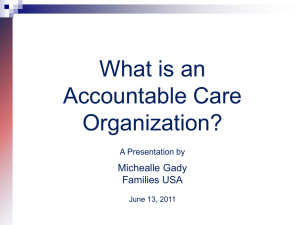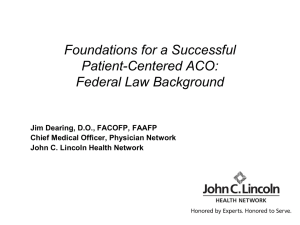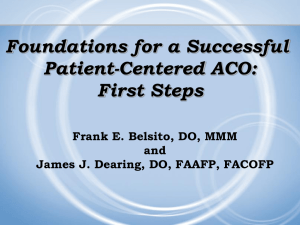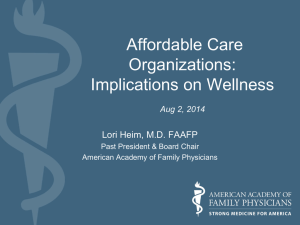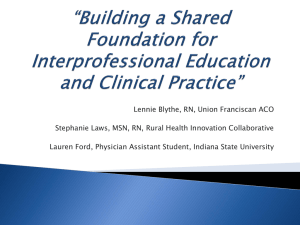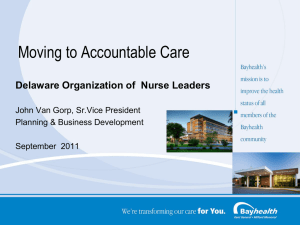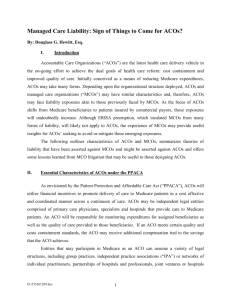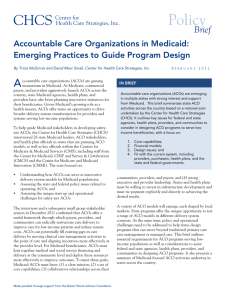House Health and Aging Committee Testimony by Michael Dalton
advertisement
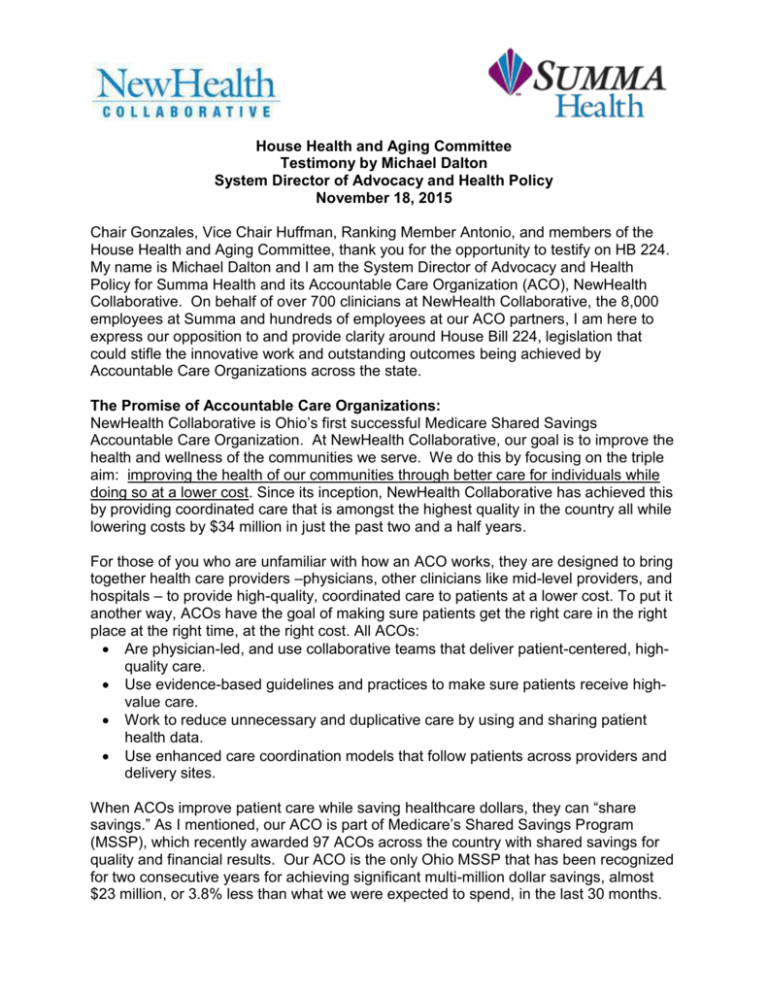
House Health and Aging Committee Testimony by Michael Dalton System Director of Advocacy and Health Policy November 18, 2015 Chair Gonzales, Vice Chair Huffman, Ranking Member Antonio, and members of the House Health and Aging Committee, thank you for the opportunity to testify on HB 224. My name is Michael Dalton and I am the System Director of Advocacy and Health Policy for Summa Health and its Accountable Care Organization (ACO), NewHealth Collaborative. On behalf of over 700 clinicians at NewHealth Collaborative, the 8,000 employees at Summa and hundreds of employees at our ACO partners, I am here to express our opposition to and provide clarity around House Bill 224, legislation that could stifle the innovative work and outstanding outcomes being achieved by Accountable Care Organizations across the state. The Promise of Accountable Care Organizations: NewHealth Collaborative is Ohio’s first successful Medicare Shared Savings Accountable Care Organization. At NewHealth Collaborative, our goal is to improve the health and wellness of the communities we serve. We do this by focusing on the triple aim: improving the health of our communities through better care for individuals while doing so at a lower cost. Since its inception, NewHealth Collaborative has achieved this by providing coordinated care that is amongst the highest quality in the country all while lowering costs by $34 million in just the past two and a half years. For those of you who are unfamiliar with how an ACO works, they are designed to bring together health care providers –physicians, other clinicians like mid-level providers, and hospitals – to provide high-quality, coordinated care to patients at a lower cost. To put it another way, ACOs have the goal of making sure patients get the right care in the right place at the right time, at the right cost. All ACOs: Are physician-led, and use collaborative teams that deliver patient-centered, highquality care. Use evidence-based guidelines and practices to make sure patients receive highvalue care. Work to reduce unnecessary and duplicative care by using and sharing patient health data. Use enhanced care coordination models that follow patients across providers and delivery sites. When ACOs improve patient care while saving healthcare dollars, they can “share savings.” As I mentioned, our ACO is part of Medicare’s Shared Savings Program (MSSP), which recently awarded 97 ACOs across the country with shared savings for quality and financial results. Our ACO is the only Ohio MSSP that has been recognized for two consecutive years for achieving significant multi-million dollar savings, almost $23 million, or 3.8% less than what we were expected to spend, in the last 30 months. Since we started New Health Collaborative four years ago, we have learned that there is no “one-size fits all” approach to improving health outcomes and lowering costs. To be successful, we had to study the unique populations we serve and carefully choose physicians and clinical leaders to design optimal care pathways and protocols for our patients. Since no two ACOs serve the same population, no two ACOs operate in exactly the same way. Accountable Care Organizations are Physician Led It is very important to reiterate that all ACOs are led by physicians. Each time new medical practices, order sets, procedures, and protocols become available, our physician governance structures evaluates and validates potential changes to the way we deliver care. We rely on evidenced-based medicine to make our decisions and then share them across the organization. Our ACO is successful because we use our clinicians in the optimal way to meet rigorous quality and patient care standards. We choose the tools we need to deliver patient-centered care while meeting quality and cost goals. This includes consulting with other providers like radiologists and pathologists as well as other clinicians, such as pharmacists, who may or may not be part of the ACO but might be employed within a health system. Our physicians are not on an island but part of a larger care team. As you can probably tell, quality improvement and care coordination are hard-wired into ACOs. They are part of our organizational DNA. At New Health Collaborative, our physicians use their expertise and the shared knowledge of their colleagues to determine when laboratory testing is appropriate and what tests are necessary. For example, there are preventive lab screenings such as routine blood draws for blood sugar tracking in diabetics that we monitor to make sure patients are receiving them. If for some reason they are not in compliance, we reach out to the patients and help coach them to get their tests regularly. The Impact of House Bill 224 At NewHealth Collaborative, we find that House Bill 224 could curb innovation by requiring each ACO in Ohio to establish a clinical laboratory testing advisory board. For the purposes of this bill, an ACO is narrowly defined as an organization that participates in the Medicare Shared Savings Program. HB 224 would mandate the creations of a clinical laboratory testing advisory board for each ACO to make non-binding recommendations regarding clinical laboratory testing used for diagnosis and disease management, pathologist consultation on episodes of care, and appropriate use of clinical laboratory testing. HB 224 would add an unnecessary layer of bureaucracy to our organization and to other ACOs across the state. If enacted, this bill could slow down our ACO’s rapid progress toward improving quality and lowering costs, something that could serve as a model to help the state in achieving its goals to cut Medicaid costs, especially in a time when the state’s share of Medicaid is ever-increasing. At NewHealth Collaborative, you have heard that we already consult with pathologists and other providers who are embedded at hospitals and labs within our health system. We see and recognize the value of other team members and don’t need this to be legislated. Furthermore, we are not aware of any case where a member of an ACO hasn’t received the services or testing they require so to talk about “undertesting” seems premature. Moreover, we find that HB 224 is structurally flawed. Contrary to previous testimony that was offered, the legislation would require a participant from a lab to serve on this advisory board even if only one member of the ACO used their services. With over 26,000 members in our ACO, we could end up with countless lab representatives on a board with each member having their own respective viewpoint and recommendation to offer. Adding additional regulatory burden and oversight requirements beyond that which is already prescribed in some 300 pages of federal regulations seems unnecessary. As cited during proponent testimony, according to a 2014 national survey, 20.8% of laboratories in ACO have never been involved in ACO operational discussions. But put another way, almost 80% of labs or pathologists in ACOs have been involved in ACO operational discussions. Furthermore, of the 9 MSSP ACOs based in Ohio, only five even existed before 2014 and none existed before 2012, the year the program began. Of those five, four were associated with a large health system, like Summa, and most likely were partnered with pathologists employed at their respective hospitals. If most ACOs in Ohio are already partnering with pathologists or have readily available access to them, then the problem that is trying to be solved is unclear. But our greatest concern is that a bill such as HB 224 will create a slippery slope where other provider groups and specialties will want to be mandated as having their own advisory board to serve in a consultative capacity for the ACO. In essence, it could create the framework for a series of forced marriages, telling us who we need to listen to and how we need to listen. Our physicians already have an overwhelming number of mandates, recommended protocols and reporting provisions, nevermind increasing pressure to take care of more patients at lower reimbursement. Now imagine several new boards telling physicians what they should and shouldn’t order and it becomes overwhelming for them. Accountable Care Organizations Are a Solution I want to emphasize that ACOS aren't viewed as a problem. Instead, ACOs are largely seen as a solution, even being cited by Governor Kasich and other leaders around the country as a welcomed and much needed partnership between payers and providers to provide higher quality care at lower costs, returning savings to state and federal governments, and ultimately the taxpayer and businesses. And if you are looking for a member of an ACO and want to know if they are working, just ask me. As a member of NewHealth Collaborative, I talk with my physicians about what testing is needed and what protocols he is following. They are hard-wired into the electronic medical record reminding him about what tests to order to make sure my cholesterol is in check and I am getting enough vitamin D. We fully understand that over 70% of diagnostic and treatment decisions made by doctors are based on medical laboratory test results. Without the work of laboratory professionals, our ACO providers would not be able to confirm their diagnosis. But our physicians don’t need a law to help us understand this – this is something that they already comprehend. On behalf of NewHealth Collaborative and Summa Health, thank you again for the opportunity to speak with you today about our reasons for opposing HB 224 and respectfully ask that you do the same.
